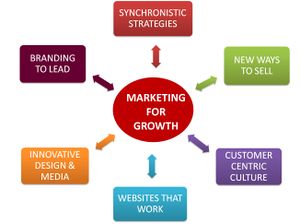Marketing
Marketing is the process of communicating the value of a product or service to customers. Marketing might sometimes be interpreted as the art of selling products, but selling is only a small fraction of marketing. As the term Marketing may replace advertising it is the overall strategy and function of promoting a product or service to the customer. The American Marketing Association defines marketing as ,the activity, set of institutions, and processes for creating, communicating, delivering, and exchanging offerings that have value for customers, clients, partners, and society at large. From a societal point of view, marketing is the link between a society’s material requirements and its economic patterns of response. Marketing satisfies these needs and wants through exchange processes and building long term relationships. The process of communicating the value of a product or service through positioning to customers. Marketing can be looked at as an organizational function and a set of processes for creating, delivering and communicating value to customers, and managing customer relationships in ways that benefit the organization and its shareholders. Marketing is the science of choosing target markets through market analysis and market segmentation, as well as understanding consumer buying behavior and providing superior customer value.
There are five competing concepts under which organizations can choose to operate their business; the production concept, the product concept, the selling concept, the marketing concept, and the holistic marketing concept. The four components of holistic marketing are relationship marketing, internal marketing, integrated marketing, and socially responsive marketing. The set of engagements necessary for successful marketing management includes, capturing marketing insights, connecting with customers, building strong brands, shaping the market offerings, delivering and communicating value, creating long-term growth, and developing marketing strategies and plans.
Marketing planning
The marketing planning process involves forging a plan for a firm's marketing activities. A marketing plan can also pertain to a specific product, as well as to an organization's overall marketing strategy. Generally speaking, an organization's marketing planning process is derived from its overall business strategy. Thus, when top management are devising the firm's strategic direction or mission, the intended marketing activities are incorporated into this plan. There are several levels of marketing objectives within an organization. The senior management of a firm would formulate a general business strategy for a firm. However, this general business strategy would be interpreted and implemented in different contexts throughout the firm.
Marketing strategy
The field of marketing strategy considers the total marketing environment and its impacts on a company or product or service. The emphasis is on an in depth understanding of the market environment, particularly the competitors and customers.
A given firm may offer numerous products or services to a marketplace, spanning numerous and sometimes wholly unrelated industries. Accordingly, a plan is required in order to effectively manage such products. Evidently, a company needs to weigh up and ascertain how to utilize its finite resources. For example, a start-up car manufacturing firm would face little success should it attempt to rival Toyota, Ford, Nissan, Chevrolet, or any other large global car maker. Moreover, a product may be reaching the end of its life-cycle. Thus, the issue of divest, or a ceasing of production, may be made. Each scenario requires a unique marketing strategy. Listed below are some prominent marketing strategy models.
A marketing strategy differs from a marketing tactic in that a strategy looks at the longer term view of the products, goods, or services being marketed. A tactic refers to a shorter term view. Therefore, the mailing of a postcard or sales letter would be a tactic, but a campaign of several postcards, sales letters, or telephone calls would be a strategy.
Use of technologies
Marketing management can also rely on various technologies within the scope of its marketing efforts. Computer-based information systems can be employed, aiding in better processing and storage of data. Marketing researchers can use such systems to devise better methods of converting data into information, and for the creation of enhanced data gathering methods. Information technology can aid in enhancing an MKIS' software and hardware components, and improve a company's marketing decision-making process. In recent years, the notebook personal computer has gained significant market share among laptops, largely due to its more user-friendly size and portability. Information technology typically progresses at a fast rate, leading to marketing managers being cognizant of the latest technological developments. Moreover, the launch of smartphones into the cellphone market is commonly derived from a demand among consumers for more technologically advanced products. A firm can lose out to competitors should it ignore technological innovations in its industry. Technological advancements can lessen barriers between countries and regions. Using the World Wide Web, firms can quickly dispatch information from one country to another without much restriction. Prior to the mass usage of the Internet, such transfers of information would have taken longer to send, especially if done via snail mail, telex, etc.
Recently, there has been a large emphasis on data analytics. Data can be mined from various sources such as online forms, mobile phone applications and more recently, social media.
